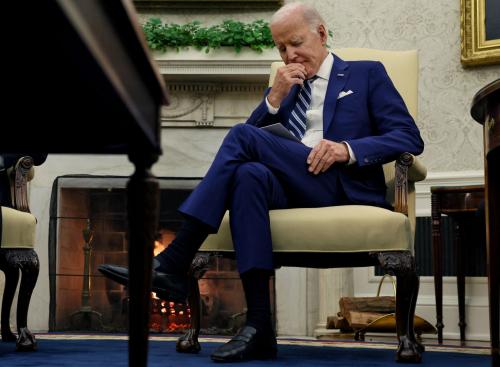Dany Bahar, fellow in Global Economy and Development, and Vanda Felbab-Brown, senior fellow in the Center for 21st Century Security and Intelligence, discuss how U.S.-Mexico relations have been affected by the Trump administration, misconceptions about NAFTA, immigration, and crime, and why taking an “America first” approach won’t help U.S. consumers.
Felbab-Brown explains how the new administration’s view of “violent crime” has broadened the concept alarmingly:
“In regards to immigration policies and the Trump administration’s claims that it wants to focus on violent violators of U.S. immigration laws, in fact, the executive orders coming over the past several weeks from the Trump administration have so broadened the notion of what is violent crime down to using U.S. food stamps as constituting violent crime and a deportable offense, while suspending regular rule of law processes. So ostensibly, while the Trump administration prides itself on exporting violent offenders, in practice, it’s really talking about en masse deportations which are financially costly and will be a burden on U.S. tax payers.”
Bahar breaks down why NAFTA aids U.S. businesses and how the job market has been affected by the trade agreement:
“American firms are strongly benefiting from this trade, because that makes American firms more competitive. They can import the intermediate goods at a lower cost, which means that they can also sell at a lower cost, not only to American consumers, but also to the rest of the world. The misconception that when you import things, it’s causing jobs to be lost, that’s not quite true, because it’s also generating a lot of jobs by American firms that are now able to export to other markets, because they’re able to import other intermediate goods from Mexico.”
Show Notes:
U.S.-Mexican relations: After the election’s vitriol, ways to strengthen a multifaceted partnership
NAFTA under Trump—the myths and the possibilities
Trump’s trade policy: protecting American workers at the expense of American consumers
With thanks to audio producer Gaston Reboredo and producer Vanessa Sauter, and also thanks for additional support from Kelly Russo, Fred Dews, and Richard Fawal.
Subscribe to Brookings podcasts here or on iTunes, send feedback email to [email protected], and follow us and tweet us at @policypodcasts on Twitter.
Intersections is part of the Brookings Podcast Network.






Commentary
PodcastU.S.-Mexico relations: Beyond “America first” rhetoric
March 29, 2017